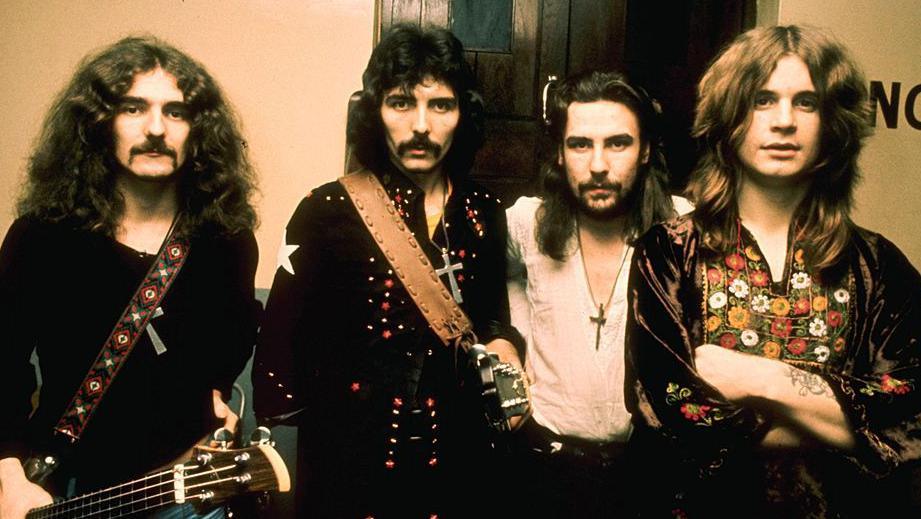In the smoky, working-class streets of Birmingham, England, four young men formed a band that would change music forever. They didn’t wear spandex, they didn’t glam up their image, and they weren’t interested in fitting into the pop scene. Instead, they brought darkness, raw energy, and a thunderous new sound that gave birth to a genre the world had never heard before: heavy metal. At the center of this sonic storm stood Ozzy Osbourne and Black Sabbath — pioneers, rebels, and architects of a cultural movement.
This is the story of how they found their sound — and with it, forged the foundation of heavy metal music.
⚒️ Birmingham Steel and Black Smoke
Birmingham in the late 1960s was no paradise. It was an industrial city, rough and unglamorous, marked by foundries, factories, and the sound of metal being forged. It’s no coincidence that the heaviest music ever created would come from a place where literal steel was pounded into shape.
Ozzy Osbourne, born John Michael Osbourne, came from Aston, a working-class area where life was hard and the future often felt bleak. Like millions of British youth, he turned to music as a way out. Around the same time, Tony Iommi, Geezer Butler, and Bill Ward were honing their skills in local blues and jazz-influenced bands.
They first came together as a blues rock outfit called Earth, playing covers and dabbling in psychedelia. But something wasn’t quite right. They didn’t sound different — yet.
Then came a moment that would shift the ground beneath their feet.
🎬 A Horror Movie Sparks a Revelation
According to legend, the band had a life-changing epiphany one day in 1969 when they noticed people lining up at a local theater to watch a horror movie. The film: Black Sabbath — starring Boris Karloff.
Geezer Butler, the band’s bassist and primary lyricist, had a fascination with the occult and fantasy literature. He pointed out something profound: People clearly love being scared. Why doesn’t anyone make scary music?
That single thought became the ignition point.
They renamed the band Black Sabbath and started leaning into the eerie, the dark, and the mysterious. But this wasn’t just a gimmick. It was a sonic revolution.
🎸 The Accident That Created the Riff
Black Sabbath’s signature heaviness owes a great deal to Tony Iommi — and a tragic accident that nearly ended his guitar career.
While working in a sheet metal factory, Iommi lost the tips of two fingers on his right hand (he’s left-handed). For most guitarists, this would have spelled the end. But Iommi refused to give up.
He fashioned homemade thimbles and began downtuning his guitar to reduce the tension on the strings. The result was a deeper, darker, more sludgy sound that had never been heard before in rock. It didn’t just accommodate his injury — it defined the entire Black Sabbath sound.
The guitar riffs became thunderous, doom-laden, and crawling with menace.
🧙 Lyrics of Dread and Darkness
With Iommi setting the tone, Geezer Butler’s lyrics explored the arcane, the apocalyptic, and the existential. War, drugs, the devil, insanity, nuclear annihilation — these weren’t just themes; they were warnings wrapped in poetry.
And then there was Ozzy.
His voice wasn’t traditionally pretty, but it was haunting. A nasal, howling wail that danced atop the gloom, sometimes fragile, sometimes ferocious. Ozzy became the voice of the void, the mouthpiece of a generation caught between the idealism of the ‘60s and the disillusionment of the ‘70s.
Together, Sabbath didn’t just make music — they created an atmosphere, one that crawled into your bones.
💿 The Birth of Heavy Metal: The First Albums
Black Sabbath’s self-titled debut album was released on Friday the 13th, February 1970. The cover, with its ghostly woman standing before a mill, was enough to unnerve listeners. But it was the music that truly stunned.
The title track, Black Sabbath, opens with the sound of rain and a distant bell tolling — and then doom descends in the form of the tritone riff, known historically as diabolus in musica or “the devil’s interval.” Banned in medieval religious music for its unsettling sound, the interval now became the bedrock of heavy metal.

The second album, Paranoid (also 1970), catapulted them to global fame. With tracks like War Pigs, Iron Man, and the anthemic title song Paranoid, Sabbath defined a new language in rock: loud, political, menacing, and heavy.
They didn’t sound like Led Zeppelin. They didn’t sound like The Rolling Stones. They were something entirely new.
🚫 Rejection from Critics, Love from the Youth
Despite their massive influence today, Black Sabbath were largely hated by music critics in their early years. Dismissed as simple, brutish, or even Satanic, the band never enjoyed the same elite critical approval that peers like The Who or Pink Floyd did.
But while critics scoffed, fans worshipped. In an era of social upheaval, war, and alienation, Black Sabbath’s doomsday anthems felt more honest than peace-and-love platitudes.
Sabbath didn’t promise salvation — they offered truth in distortion.
🧨 Ozzy’s Wild Charisma and Tragic Brilliance
A big part of Sabbath’s allure was Ozzy Osbourne himself. Equal parts eccentric, unpredictable, and strangely innocent, Ozzy was the magnetic core of the band. His on-stage presence was hypnotic, his eyes wide and wild, his vocals drenched in despair or madness.
Yet offstage, Ozzy was struggling. Substance abuse, insecurity, and internal band tensions would eventually lead to his departure from the band in 1979.
But by then, the seeds of heavy metal had already taken root in the global consciousness.
🔥 Legacy: The Metal Tree Grows
Black Sabbath’s influence can be heard in every subgenre of metal that followed: doom, thrash, stoner, death, black metal — you name it. Every one of them traces its lineage back to the ominous bell that tolls on their debut.
Bands like Metallica, Slayer, Pantera, and Mastodon have all cited Sabbath as ground zero. And Ozzy, through his solo career and especially the Blizzard of Ozz era, continued to push the genre’s boundaries with guitarist Randy Rhoads at his side.
What’s more, Sabbath didn’t just invent a sound — they invented a feeling.
The sense that music could confront the ugly parts of life. That it could be cathartic rather than comforting. That volume, distortion, and darkness had beauty, too.
⚰️ The Final Bow — And the Immortality of Sound
After decades of lineup changes, controversies, and comebacks, the original members reunited in the 2010s for a final run. In 2017, Black Sabbath played their last concert in Birmingham, closing the circle where it all began.
It was more than a farewell. It was a coronation.
Black Sabbath didn’t just create heavy metal — they became mythic symbols of its spirit. And Ozzy Osbourne, the so-called “Prince of Darkness,” became one of the most beloved and unlikely survivors in rock history.
From biting bats to reality TV, Ozzy’s journey is one of resilience, absurdity, and strange poetic justice. Because for all his chaos, Ozzy helped invent a genre that gave millions of misfits a home.
🎤 Final Riff: The Sound of Forever
Today, “heavy metal” is a global culture. It has its own fashion, festivals, ideology, and legacy. But none of it would exist without that rainy day in Birmingham, without that horror film marquee, and without four men who turned fear into music.
Ozzy Osbourne and Black Sabbath didn’t just play loud. They played real.
And in doing so, they created a thunder that still echoes — not just through amps and speakers, but through generations of fans who find solace in the noise.
That’s not just music. That’s immortality.

